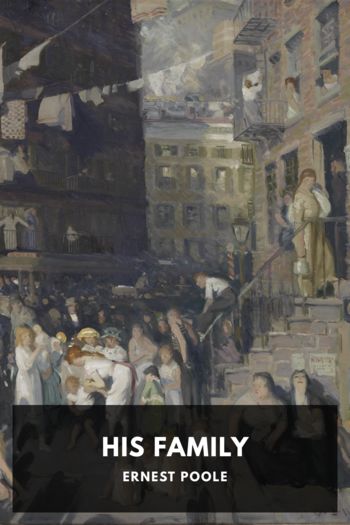His Family - Ernest Poole (ereader for comics .txt) 📗

- Author: Ernest Poole
Book online «His Family - Ernest Poole (ereader for comics .txt) 📗». Author Ernest Poole
“I’m afraid you’ll have to try to do without your nurse for a while.”
“Let Hannah go? Oh, father!” And Edith flushed with quick dismay. “How can I, dad? Five children—five! And two of them so little they can’t even dress themselves alone! And there are all their meals—their baths—and the older ones going uptown to school! I can’t let them go way uptown on the bus or the trolley without a maid—”
“But, Edith!” he interrupted, his face contracting with distress. “Don’t you see that they can’t go to school?” She turned on him. “Uptown, I mean, to those expensive private schools.”
“Father!” she demanded. “Do you mean you want my children to go to common public schools?” There was rage and amazement upon her pretty countenance, and with it an instant certainty too. Yes, this was Deborah’s planning! But Roger thought that Edith’s look was all directed at himself. And for the first time in his life he felt the shame and humility of the male provider no longer able to provide. He reddened and looked down at his plate.
“You don’t understand,” he said. “I’m strapped, my child—I can’t help it—I’m poor.”
“Oh. Oh, dad. I’m sorry.” He glanced up at his daughter and saw tears welling in her eyes. How utterly miserable both of them were.
“It’s the war,” he said harshly and proudly. This made a difference to his pride, but not to his daughter’s anxiety. She was not interested in the war, or in any other cause of the abyss she was facing. She strove to think clearly what to do. But no, she must do her thinking alone. With a sudden quiet she rose from the table, went around to her father’s chair and kissed him very gently.
“All right, dear—I see it all now—and I promise I’ll try my best,” she said.
“You’re a brave little woman,” he replied.
But after she had gone, he reflected. Why had he called her a brave little woman? Why had it all been so intense, the talk upon so heroic a plane? It would be hard on Edith, of course; but others were doing it, weren’t they? Think of the women in Europe these days! After all, she’d be very comfortable here, and perhaps by Christmas times would change.
He shook off these petty troubles and went to his office for the day.
As she busied herself unpacking the trunks, Edith strove to readjust her plans. By noon her head was throbbing, but she took little notice of that. She had a talk with Hannah, the devoted Irish girl who had been with her ever since George was born. It was difficult, it was brutal. It was almost as though in Edith’s family there had been two mothers, and one was sending the other away.
“There, there, poor child,” Edith comforted her, “I’ll find you another nice family soon where you can stay till I take you back. Don’t you see it will not be for long?” And Hannah brightened a little.
“But how in the wide wurrld,” she asked, “will you ever do for the children, me gone?”
“Oh, I’ll manage,” said Edith cheerfully. And that afternoon she began at once to rearrange her whole intricate schedule, with Hannah and school both omitted, to fit her children into the house. But instead of this, as the days wore on, nerve-racking days of worry and toil, sternly and quite unconsciously she fitted the house to her children. And nobody made her aware of the fact. All summer long in the mountains, everyone by tacit consent had made way for her, had deferred to her grief in the little things that make up the everyday life in a home. And to this precedent once established Edith now clung unawares.
Her new day gave her small time to think. It began at five in the morning, when Roger was awakened by the gleeful cries of the two wee boys who slept with their mother in the next room, the room which had been Deborah’s. And Edith was busy from that time on. First came the washing and dressing and breakfast, which was a merry, boisterous meal. Then the baby was taken out to his carriage on the porch at the back of the house. And after that, in her father’s study from which he had fled with his morning cigar, for two hours Edith held school for her children, trying her best to be patient and clear, with textbooks she had purchased from their former schools uptown. For two severe hours, shutting the world all out of her head, she tried to teach them about it. At eleven, their nerves on edge like her own, she sent them outdoors “to play,” entrusting the small ones to Betsy and George, who took them to Washington Square nearby with strict injunctions to keep them away from all other children. No doubt there were “nice” children there, but she herself could not be along to distinguish the “nice” from the “common”—for until one o’clock she was busy at home, bathing the baby and making the beds, and then hurrying to the kitchen to pasteurize the baby’s milk and keep a vigilant oversight on the cooking of the midday meal. And the old cook’s growing resentment made it far from easy.
After luncheon, thank heaven, came their naps. And all afternoon, while again they went out, Edith would look over their wardrobes, mend and alter and patch and contrive how to make last winter’s clothes look new. At times she would drop her work in her lap and stare wretchedly before her. This was what she had never known; this was what made life around her grim and hard, relentless, frightening; this was what it was to be poor. How it changed the whole city of New York. Behind it,





Comments (0)